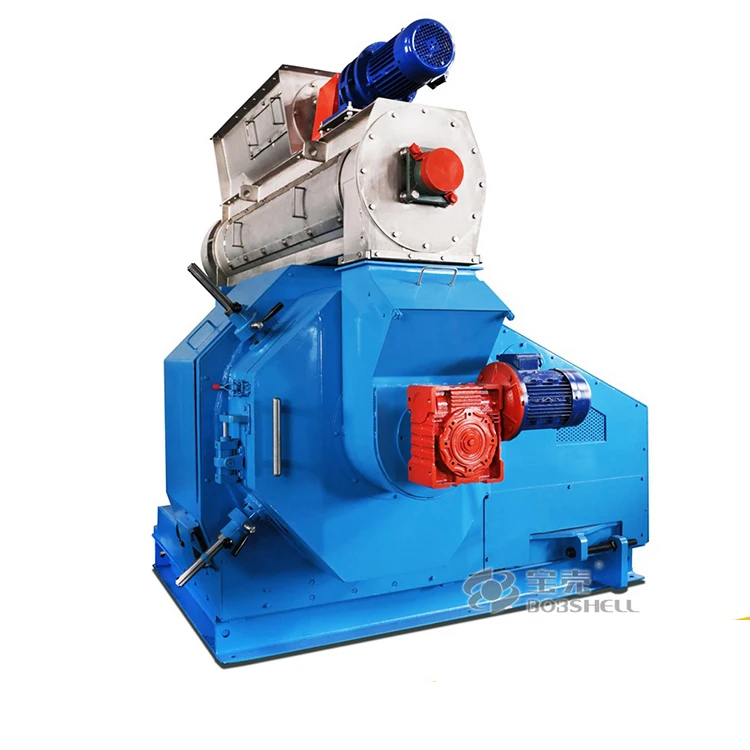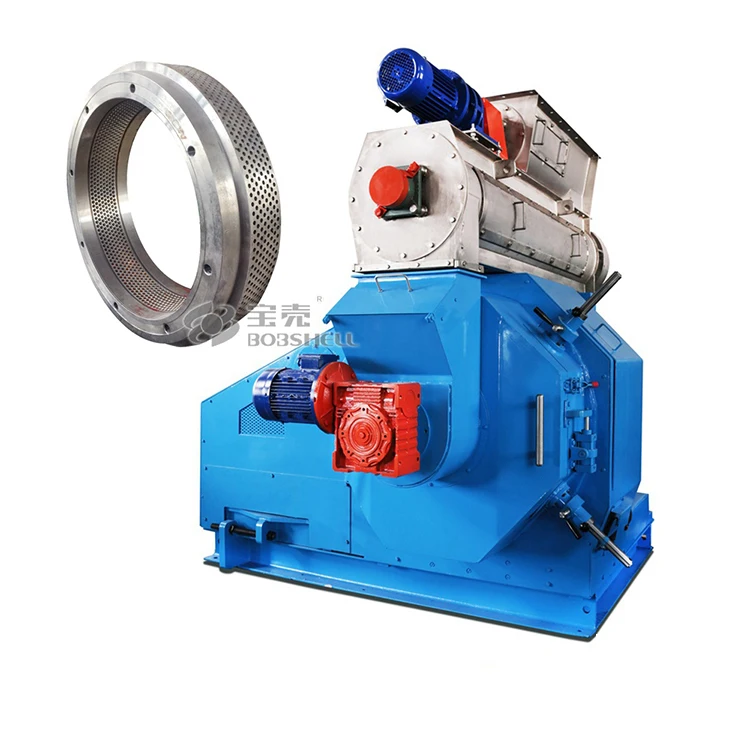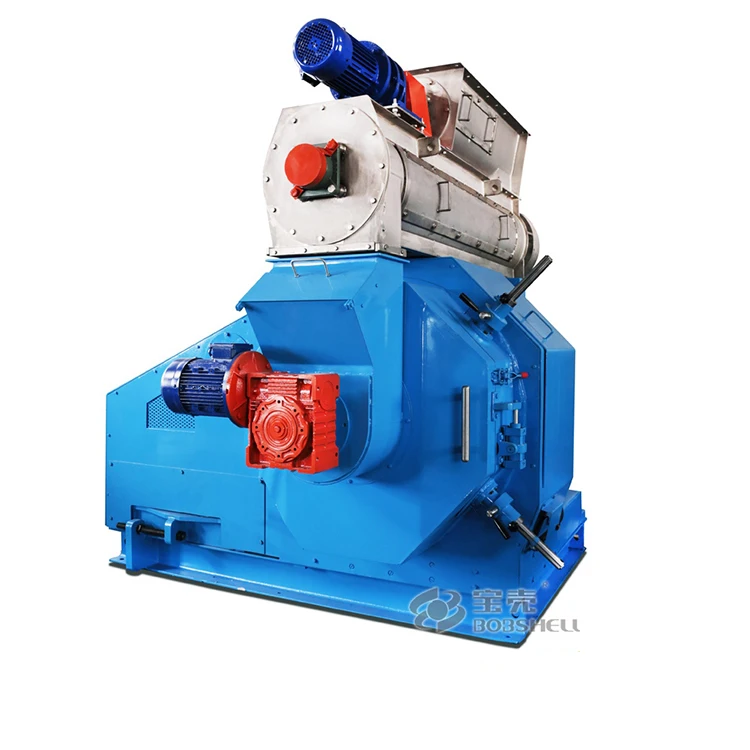Producing wood pellets,animal feeds pellets and other pellets
MOQ: 1 pcs
Delivery time:10 to 30 days after receipt of the advance payment
The entire machine is guaranteed fo r 3 years, except fo r easily worn parts.
Ring die: Working life of bloenergy pellets be 1000 hours, Working life of animal feed pellets be 1500 hours.
All steel from top tier factories will be used
Compliant with GB/T 19001-2016/ISO 9001:2015
The factory covers an area of over 13000 square meters and has two large production workshops and a comprehensive warehouse.
Feed Granulator HKJ300, After investigating the existing feed granulators in the world, considering the different requirements of the applicable objects on the granulated feed, especially considering the characteristics of high hardness and high density of the pressed particles, HKJ annular model feed granulator was designed and manufactured.
The machine has a simple structure, so it can be widely used in small and medium-sized aquaculture, grain feed processing plants, livestock farms, poultry farms and individual farmers.
| Product name | biofuel pellet mill |
| Keyword | victor pellet mill machine,biomass pellet mill manufacturers,pellet mill china,hardwood pellet mill,turn key pellet mill,farm tech pellet mill,famsun pellet mill |
| Place of Origin | China |
| Production Capacity | 1192~400/Per Min |
| Power | 2.2~6kw |
| Thread Dia(mm) | 2.0~4.0 |
| Thread Length(mm) | 3~50 |
| Feature | pipe nipple threading machine in its rolling pressure range of cold, the workpiece for thread, ruled, twill and other treatment; straight, helical and oblique spline gear rolling; straightening, reducing diameter, rolling and various forming rolling. |
| Dimensions | 3246mm*2317mm*2334mm, (Contact us for specific information to confirm) |
| Applicable Industries | animal husbandry, etc. |
| Color | red or customized |
| Weight | 5944kg |
| Product Description | The machine has a safe and reliable electro-hydraulic execution and control system. Each work cycle can be selected in manual, semi-automatic and automatic ways. |
| terms of packing | enerally, we pack our goods in plywood cases. |
| terms of paymen | T/T 30% as deposit, and 70% balance against BL copy |
| Life span | 16 years (Contact us for specific information to confirm) |
| After-sale service | 12 months warrantly, man-made destory will be exception. |
| biofuel pellet mill Advantage | We keep good quality and competitive price to ensure our customers benefit |
| Packing | 3549x2531x3205mm(Contact us for specific information to confirm) |
| OEM/ODM | Customization Service Provided |
| Sales country | All over the world for example:Tajikistan,Martinique,Thailand,Venezuela,Niger |
| MOQ | 7pcs(Contact us for specific information to confirm) |
| Delivery time | 15-20 days for OEM, 5-7days for ready goods. |



biofuel pellet mill
as one of the most professional biofuel pellet mill manufacturer has the advantages at:
The company's BOBSHELL brand serial products have accumulated served over 1200 clients around the world and be long-lasting reliable supplier of GF, LA MECCANICA, CPM, BUHLER, ANDRITZ which are world famous firms in Pellet industry.
Hongxing Machinery insists on the mission of "World class quality,serve Chinese clients to expand the markets."Bobshell" parts have gained huge competition advantages in the fields of animal feeds,biomass fuels,chemicals, organic fertilizers etc.
biofuel pellet mill services FAQs Guide
Are you looking for a quick review guide about biofuel pellet millservices?
An ultimate FAQ buying guide is available to help you.This guide contains all the information about all the important facts, figures, and various processes regarding biofuel pellet mill services.
Let’s continue!
1.Can a biofuel pellet mill help reduce waste and promote sustainability?
We have rich industry experience and professional knowledge, and have strong competitiveness in the market.
Yes, a pellet mill can definitely help reduce waste and promote sustainability. Pellet mills are machines that compress biomass materials, such as wood chips, sawdust, and agricultural waste, into small pellets that can be used as fuel for heating and cooking. By using pellet mills, waste materials that would otherwise end up in landfills can be repurposed and turned into a valuable energy source. This not only reduces the amount of waste in landfills, but also decreases the need for non-renewable energy sources, promoting sustainability. Additionally, using pellets as a fuel source can help reduce carbon emissions and air pollution, making it a more environmentally friendly option. Overall, pellet mills play a crucial role in reducing waste and promoting sustainability.
2.How does the use of a biofuel pellet mill contribute to sustainable forestry practices?
We should perform well in market competition, and the prices of biofuel pellet mill products have a great competitive advantage.
The use of a pellet mill contributes to sustainable forestry practices in several ways.
Firstly, pellet mills use wood waste and byproducts from the forestry industry, such as sawdust and wood chips, to produce pellets. This reduces the amount of waste generated from logging and milling operations, promoting a more efficient use of resources and reducing the need for additional harvesting.
Secondly, pellet mills produce a high-quality and consistent fuel source that can be used for heating and electricity generation. This reduces the reliance on fossil fuels and promotes the use of renewable energy sources, contributing to a more sustainable energy mix.
Additionally, the use of pellet mills can help to manage and maintain healthy forests. By removing excess biomass and thinning out overgrown areas, pellet mills can help prevent wildfires and promote the growth of new trees.
Overall, the use of pellet mills supports sustainable forestry practices by reducing waste, promoting renewable energy, and maintaining healthy forests for future generations.

3.How does a biofuel pellet mill work?
Our biofuel pellet mill products undergo strict quality control to ensure customer satisfaction.
A pellet mill is a machine that compresses raw materials, such as wood, sawdust, or agricultural waste, into small, dense pellets. The process starts by feeding the raw materials into a hopper, where they are then transported to a chamber where they are compressed by a roller and die. The pressure and heat generated by the roller and die cause the raw materials to bind together and form pellets. The pellets are then cut to the desired length and cooled before being discharged from the machine. The pellets can be used as fuel for heating or cooking, or as animal feed. Pellet mills are efficient and environmentally friendly, as they use renewable resources and produce minimal waste.
4.How can a biofuel pellet mill help reduce air pollution?
We continue to invest in research and development and continue to launch innovative products.
A pellet mill can help reduce air pollution in several ways:
1. Use of renewable energy: Pellet mills use biomass materials such as wood, sawdust, and agricultural waste to produce pellets. These materials are renewable and do not emit harmful pollutants like fossil fuels, which contribute to air pollution.
2. Efficient combustion: Pellets produced by a pellet mill have a high density and low moisture content, making them burn more efficiently and produce less smoke and particulate matter. This reduces the amount of harmful pollutants released into the air.
3. Reduction of waste: Pellet mills can process waste materials that would otherwise end up in landfills, emitting harmful gases as they decompose. By converting these materials into pellets, the pellet mill helps reduce the amount of waste and air pollution.
4. Replacement of traditional fuels: Pellets can be used as a substitute for traditional fuels like coal and oil, which are major contributors to air pollution. By using pellets instead, the emissions of harmful pollutants can be significantly reduced.
5. Encouraging sustainable practices: The use of pellet mills promotes sustainable practices by utilizing renewable materials and reducing waste. This can lead to a decrease in overall air pollution levels and contribute to a healthier environment.

5.How can a biofuel pellet mill help promote energy independence?
We pay attention to the introduction and training of talents, scientifically regulate the management system, and focus on cultural construction and team cohesion.
A pellet mill can help promote energy independence in several ways:
1. Use of renewable energy sources: Pellet mills use biomass materials such as wood, sawdust, and agricultural waste to produce pellets. These materials are renewable and can be sustainably sourced, reducing our dependence on non-renewable energy sources.
2. Reduced reliance on fossil fuels: Pellet mills produce pellets that can be used as a substitute for fossil fuels such as coal and oil. This reduces our dependence on these non-renewable resources and promotes energy independence.
3. Local production: Pellet mills can be set up in local communities, allowing for the production of pellets on a small scale. This reduces the need for long-distance transportation of energy sources, promoting energy independence at a local level.
4. Diversification of energy sources: By using a pellet mill, we can diversify our energy sources and reduce our reliance on a single source. This promotes energy independence and reduces the risk of energy shortages.
5. Cost-effective energy production: Pellet mills can produce energy at a lower cost compared to traditional energy sources. This makes energy more affordable and accessible, promoting energy independence for individuals and communities.
6.What is the lifespan of a biofuel pellet mill?
We have advantages in marketing and channel expansion. Suppliers have established good cooperative relations, continuously improved workflows, improved efficiency and productivity, and provided customers with high -quality products and services.
The lifespan of a pellet mill can vary depending on several factors such as the quality of the machine, maintenance, and usage. On average, a well-maintained pellet mill can last anywhere from 5 to 10 years. However, with proper care and regular maintenance, some pellet mills have been known to last up to 20 years.
The quality of the machine is a crucial factor in determining its lifespan. A high-quality pellet mill made with durable materials and precision engineering can last longer than a lower quality machine.
Regular maintenance is also essential in prolonging the lifespan of a pellet mill. This includes cleaning, lubricating, and replacing worn parts as needed.
The usage of the pellet mill also plays a role in its lifespan. A pellet mill that is used frequently and for extended periods may have a shorter lifespan compared to one that is used less frequently.
Overall, the lifespan of a pellet mill can be extended with proper care and maintenance, allowing it to produce high-quality pellets for many years.

7.About the scale of biofuel pellet mill factory
The factory covers an area of over 13000 square meters and has two large production workshops and a comprehensive warehouse.
8.How can a biofuel pellet mill help reduce costs for animal feed and livestock production?
We have been working hard to improve service quality and meet customer needs.
A pellet mill can help reduce costs for animal feed and livestock production in several ways:
1. Efficient use of raw materials: Pellet mills can process a variety of raw materials, including grains, grasses, and by-products from other industries, into high-quality pellets. This allows for more efficient use of resources and reduces the need for expensive feed ingredients.
2. Reduced labor costs: Pellet mills are automated machines that require minimal human labor to operate. This can save on labor costs and increase efficiency in the production process.
3. Improved feed conversion: Pellets have a higher density and are more easily digestible for animals, leading to improved feed conversion and reduced feed waste. This can result in cost savings for feed and improved animal health.
4. Customized feed formulations: Pellet mills allow for the production of customized feed formulations, tailored to the specific nutritional needs of different animals. This can lead to better animal health and reduced costs associated with health issues.
5. Longer shelf life: Pellets have a longer shelf life compared to traditional feed, reducing the risk of spoilage and waste. This can result in cost savings for feed and improved profitability for livestock producers.
Overall, the use of a pellet mill can help reduce costs for animal feed and livestock production by increasing efficiency, improving feed quality, and reducing waste.

9.What are the maintenance requirements for a biofuel pellet mill?
Our products & services cover a wide range of areas and meet the needs of different fields.
1. Regular Cleaning: The pellet mill should be cleaned regularly to remove any dust, debris, or residue that may accumulate during operation. This will help prevent clogging and ensure smooth operation.
2. Lubrication: Proper lubrication is essential for the smooth functioning of a pellet mill. The bearings, rollers, and other moving parts should be lubricated regularly to prevent wear and tear and extend the lifespan of the machine.
3. Inspection and Replacement of Parts: The pellet mill should be inspected regularly for any signs of wear and tear. Any damaged or worn-out parts should be replaced immediately to prevent further damage to the machine.
4. Adjustments and Calibration: The pellet mill should be calibrated and adjusted regularly to ensure it is producing high-quality pellets. This includes adjusting the die and rollers, as well as checking the moisture content of the raw materials.
10.What are the factors that impact the production capacity of a biofuel pellet mill?
We have a professional team that is committed to the innovation and development of biofuel pellet mill.
1. Type and size of the pellet mill: The type and size of the pellet mill can greatly impact its production capacity. Larger and more advanced pellet mills can produce more pellets in a shorter amount of time compared to smaller and less efficient ones.
2. Raw material quality: The quality of the raw materials used in the pellet production process can affect the production capacity. High-quality raw materials with consistent size and moisture content can result in a higher production capacity.
3. Die and roller design: The design of the die and roller in a pellet mill can also impact its production capacity. A well-designed die and roller can ensure a smooth and efficient pellet production process, resulting in a higher production capacity.
4. Maintenance and upkeep: Regular maintenance and upkeep of the pellet mill can help maintain its production capacity. Neglecting maintenance can lead to decreased efficiency and lower production capacity.
5. Operator skill and experience: The skill and experience of the operator can also affect the production capacity of a pellet mill. A skilled operator can optimize the production process and troubleshoot any issues that may arise, resulting in a higher production capacity.

11.How does the cost of a biofuel pellet mill compare to other forms of biomass conversion equipment?
We have broad development space in domestic and foreign markets. biofuel pellet mill have great advantages in terms of price, quality, and delivery date.
The cost of a pellet mill can vary depending on the size and capacity of the equipment, but generally it is more expensive than other forms of biomass conversion equipment such as briquetting machines or gasifiers. This is because pellet mills require more complex machinery and processes to produce high-quality pellets. Additionally, the cost of raw materials for pellets, such as wood or agricultural waste, can also impact the overall cost of operating a pellet mill. However, pellet mills have the advantage of producing a more uniform and compact fuel source, making them more efficient and cost-effective in the long run.
Tag:rabbit feed pellet mill,wood pellet mill china,rice straw pellet mill,stock feed pellet mill,rowena pellet mill,azeus pellet mill
Copyright © Zhangjiakou Hongxing Machinery Co., Ltd. All Rights Reserved